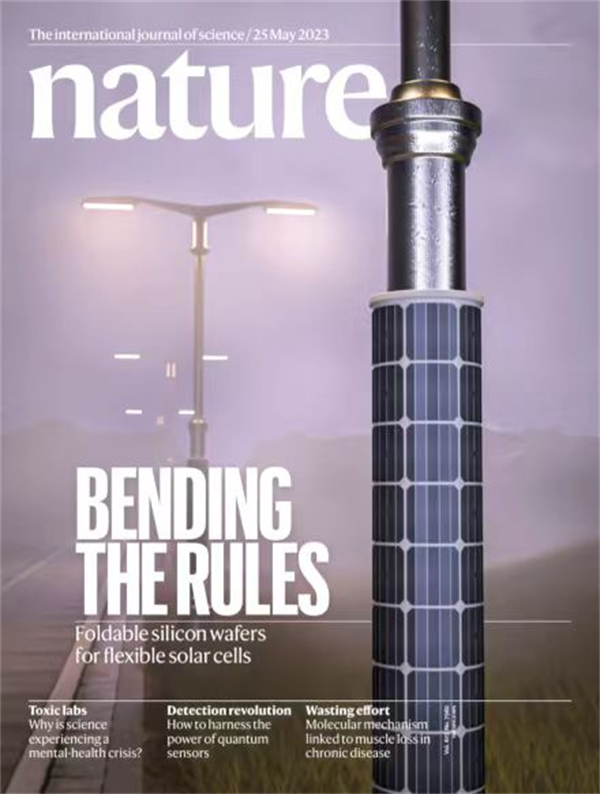
On May 24, the main issue of Nature, a top international academic journal, published a cover article on a milestone research achievement, by Liu Xiaochun, a Distinguished Professor of “Huxiang Scholar” of Changsha University of Science & Technology (CSUST), in collaboration with teams from several research institutions at home and abroad. The paper, of which Dr. Liu Xiaochun and Dr. Liu Yujing from the School of Materials Science & Engineering at CSUST are the co-lead author and the co-corresponding author, is entitled Flexible Solar Cells Based on Foldable Silicon Wafers with Blunted Edges with CSUST as its third signatory. In this paper, Dr. Liu Xiaochun’s team, in response to the key scientific issue of crystalline silicon solar cells manufacture, adopting an advanced double spherical differential correction transmission electron microscope (TEM) characterization technique, sheds light on the micro-mechanism of substrates transformation from intrinsically “brittle” to lightweight “flexible”. This research lays a theoretical foundation for the development of flexible crystalline silicon solar cells that are lighter, more efficient and with lower cost, breaking the yoke of traditional application scenarios.
Crystalline silicon solar cells, with crystalline silicon as its base material, are currently the most widely used solar cells in photovoltaic industry. In scientific and engineering circles, crystalline silicon solar cells are universally viewed as a kind of brittle cells, and they are still limited to space and other application scenarios due to their rigidity despite their extensive existence in the ground and other familiar life scenarios. It has become a common aspiration of the PV industry worldwide to consistently beef up the efficiency of crystalline silicon solar cells and extend their application scenarios.
The first corresponding author and lead author, Liu Wenzhu, an associate fellow of Shanghai Institute of Microsystems & Information Technology at Chinese Academy of Sciences, also a visiting professor of CSUST, innovatively introduces nitric acid/hydrofluoric acid chemical passivation and plasma isotropic etching method to fabricate solar cell modules that can be bent at large angles.
It is reported that the original scientific research achievement of flexible silicon solar cells published in the journal Nature are accomplished by 47 scientists and entrepreneurs from 20 research institutions and enterprises at home and abroad, including CSUST, Shanghai Institute of Microsystems & Information Technology at Chinese Academy of Sciences, Institute of Aerospace Information at Chinese Academy of Sciences, Tongwei Solar Energy (Sichuan) Co. Ltd. The project gets sponsorship from National Natural Science Foundation of China, Shanghai Science and Technology Commission, Zhangjiang National Laboratory and also start-up funds from CSUST.
*News link: https://www.nature.com/articles/s41586-023-05921-z



















